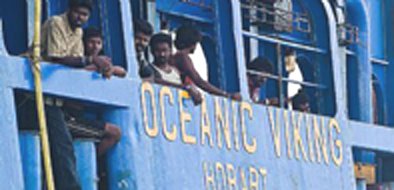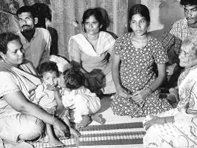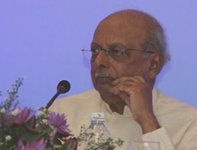 அமெரிக்க அரசு இலங்கை அரசின் நடந்து முடிந்த யுத்தம் பற்றிய அறிக்கையை இன்று (ஒக்ரோபர் 22) வெளியிட்டுள்ள அதே நேரம் வன்னி முகாம்களில் உள்ள மக்களில் 40 000 பேரை மீள்குடியேற்றுவதற்கான அறிவிப்பை இலங்கை அரசு இன்று (ஒக்ரோபர் 22)ல் வெளியிட்டுள்ளது. நடந்த முடிந்த யுத்தத்தில் பாதுகாப்பு வலயங்களை அறிவித்துவிட்டு அந்த பாதுகாப்பு வலயங்களை நோக்கி இலங்கைப் படைகள் செல் தாக்குதல்களை நடத்தி உள்ளனர், தற்காலிக யுத்த நிறுத்தங்களை அறிவித்துவிட்டு யுத்த நிறுத்தம் முடிவடைவதற்கு முன்னரே அரச படைகள் தாக்குதலை நடத்தி உள்ளனர், சரணடைந்த விடுதலைப் புலிகளை இலங்கை அரசு சட்டவிரோதமாகக் கொலை செய்துள்ளது, வன்னி மக்கள் தடுத்து வைக்கப்பட்டுள்ள தடுப்பு முகாம்கள் மிக மோசமான நிலையில் இருக்கின்றது போன்ற குற்றச்சாட்டுக்களை அமெரிக்க ராஜாங்க அமைச்சின் அறிக்கை கொண்டுள்ளது. இந்த அறிக்கையை சர்வதேச அரங்கில் பலவீனப்படுத்தி அதனை பெரிது பண்ண விடாமல் செய்யும் வகையில் இலங்கை அரசு ஏற்கனவே திட்டமிட்டபடி வன்னி முகாம்களில் இருந்து ஒரே தடவையில் 40 000 பேரை விடுவிக்கும் அறிவிப்பை வெளியிட்டதுடன் இன்று 5700 பேரை விடுவித்தும் உள்ளது.
அமெரிக்க அரசு இலங்கை அரசின் நடந்து முடிந்த யுத்தம் பற்றிய அறிக்கையை இன்று (ஒக்ரோபர் 22) வெளியிட்டுள்ள அதே நேரம் வன்னி முகாம்களில் உள்ள மக்களில் 40 000 பேரை மீள்குடியேற்றுவதற்கான அறிவிப்பை இலங்கை அரசு இன்று (ஒக்ரோபர் 22)ல் வெளியிட்டுள்ளது. நடந்த முடிந்த யுத்தத்தில் பாதுகாப்பு வலயங்களை அறிவித்துவிட்டு அந்த பாதுகாப்பு வலயங்களை நோக்கி இலங்கைப் படைகள் செல் தாக்குதல்களை நடத்தி உள்ளனர், தற்காலிக யுத்த நிறுத்தங்களை அறிவித்துவிட்டு யுத்த நிறுத்தம் முடிவடைவதற்கு முன்னரே அரச படைகள் தாக்குதலை நடத்தி உள்ளனர், சரணடைந்த விடுதலைப் புலிகளை இலங்கை அரசு சட்டவிரோதமாகக் கொலை செய்துள்ளது, வன்னி மக்கள் தடுத்து வைக்கப்பட்டுள்ள தடுப்பு முகாம்கள் மிக மோசமான நிலையில் இருக்கின்றது போன்ற குற்றச்சாட்டுக்களை அமெரிக்க ராஜாங்க அமைச்சின் அறிக்கை கொண்டுள்ளது. இந்த அறிக்கையை சர்வதேச அரங்கில் பலவீனப்படுத்தி அதனை பெரிது பண்ண விடாமல் செய்யும் வகையில் இலங்கை அரசு ஏற்கனவே திட்டமிட்டபடி வன்னி முகாம்களில் இருந்து ஒரே தடவையில் 40 000 பேரை விடுவிக்கும் அறிவிப்பை வெளியிட்டதுடன் இன்று 5700 பேரை விடுவித்தும் உள்ளது.
இவ்வாண்டு முடிவிற்குள் இலங்கை அரசு வன்னி முகாம்களில் உள்ள 80 வீதமான அவர்களது சொந்த இடங்களில் மீளக் குடியமர்த்துவதில் உறுதியாக இருப்பதாக அண்மையில் இலங்கைக்கு விஜயம் செய்த சர்வதேச அபிவிருத்திச் செயலகத்தின் செயலாளர் மைக்கல் போஸ்ர் நேற்று (ஒக்ரோபர் 21)ல் பிரித்தானிய பாராளுமன்றத்தில் இடம்பெற்ற விவாதத்தின் போது தெரிவித்தார். வன்னி முகாம்களில் சுகாதாரம், மனிதத்துவ உதவிகளுக்கான அனுமதி இன்னமும் மட்டுமப்படுத்தப்பட்டு இருப்பதாகவும் குடும்ப உறுப்பினர்கள் பிரிக்கப்பட்டு இருப்பதாகவும் அதீத இராணுவ கட்டுப்பாடு பற்றி தாங்கள் கரிசனை கொண்டிருப்பதாகவும் மைக்கல் போஸ்ரர் கேள்வி ஒன்றுக்கு பதிலளிக்கையில் தெரிவித்தார். தான் ஏப்ரலில் விஜயம் செய்த போது இருந்த நிலைமைகளிலும் தற்போதுள்ள நிலை முன்னேற்றகரமாக இருப்பதாகத் தெரிவித்துள்ள அவர் அடிப்படைத் தேவைகளான உணவும் உறைவிடமும் அனைவருக்கும் வழங்கப்பட்டு உள்ளதாகவும் அவர் தெரிவித்துள்ளார். இவ்வாண்டு முடிவிற்குள் 80 வீதமானவர்களை மீளக் குடியேற்றுவதற்கான கண்ணி வெடிகளை அகற்றுவது போன்ற பணிகளுக்கு 500 000 பவுண்களை வழங்க உள்ளதாகவும் அவர் அறிவித்தார்.
இலங்கைகயின் ஏற்றுமதிப் பொருட்களுக்கு வழங்கப்பட்ட வரி நீக்கச் சலுகையை – ஜிஎஸ்பி பிளஸ் யை நீக்குவது பற்றி எழுப்பப்பட்ட கேள்விக்குப் பதிலளித்த மைக்கல் போஸ்ரர்அது தொடர்பாக வெளிவந்துள்ள அறிக்கை சுட்டிக்காட்டுகின்ற விடயங்கள் தொடர்பாக இலங்கை அரசாங்கம் நடவடிக்கை எடுக்கும் என்று நம்புவதாகத் தெரிவித்தார். தொழிற்கட்சிப் பாராளுமன்ற உறுப்பினர் சினோபிம் மக்டோனா ஜிஎஸ்பி பிளஸ் சலுகையை நீக்க வேண்டும் என்று குறிப்பிடுகையில் கொன்சவேடிவ் கட்சி பாராளுமன்ற உறுப்பினர் ஜெப்ரி கிளிப்ரன்-பிறவுன் ’80 வீதமான மக்களை கிறிஸ்மஸ்ஸிற்கு முன்னதாக மீளக்குடியமர்த்தவும் மீளவும் உறவுகளை வலுப்படுத்தவும் இலங்கை அரசாங்கத்தை சம்மதிக்க வைப்பதற்கு ஜீஎஸ்பி பிளசை நீக்குவதா ஆரோக்கியமான நடவடிக்கை? இதனையா வெளிநாடுகளில் உள்ள இலங்கையர்களும் பிரித்தானியாவில் உள்ள இலங்கையர்களும் தீவிரமாக எதிர்பார்க்கிறார்கள்’ என்று கேள்வி எழுப்பினார்.
அங்கு மைக்கல் போஸ்ரர் மேலும் தெரிவிக்கையில் செப்ரம்பரில் 32 000 பேர் வன்னி முகாம்களில் இருந்து வெளியேறி உள்ளனர் என்றும் மேலும் 41 000 பேரை மன்னார், முல்லைத்தீவு, கிளிநொச்சியில் மீள்குடியேற்ற ஐஓஎம் இன் உதவியை நாடி இருப்பதாகவும் அவர் குறிப்பிட்டார்.
பிரித்தானிய பாராளுமன்ற விவாதமும் இலங்கை அரசின் 40 000 பேரை விடுவிக்கின்ற அறிவிப்பும் இலங்கை அரசு தான் இழந்த சர்வதேச அங்கிகாரத்தை மீளவும் தக்க வைப்பதற்கான நடவடிக்கையில் இறங்கி இருப்பதை வெளிப்படுத்துகின்றது. தமிழகத்தில் இருந்து சட்டசபை உறுப்பினர்களை வரவழைத்து அவர்களது வேண்டுகோள்களை ஏற்றுக்கொள்வது போன்ற ஒரு நடவடிக்கையையும் எடுத்து வன்னி முகாம்களில் உள்ளவர்கள் தற்போது ஆயிரக்கணக்கில் விடுவிக்கப்பட்டு வருகின்றனர். முகாம் மக்களை குறிப்பிட்ட காலத்திற்குள் விடுவிப்பது என்ற திட்டம் இலங்கை அரசிடம் ஏற்கனவே இருந்தது என்பதும் தமிழீழ விடுதலைப் புலிகளிடம் இருந்து விடுவிக்கப்பட்ட பிரதேசங்களில் மட்டுப்படுத்தப்பட்ட அபிவிருத்திப் பணிகள் மேற்கொள்ளப்பட்டது என்பதும் பற்றி தேசம்நெற்றில் பரவலாக செய்திகள் வெளிவந்திருந்தது. மேலும் கிளிநொச்சி முல்லைத்தீவு மாவட்டங்களில் உள்ள படையினர் பலரும் இப்பணிகளில் ஈடுபடுத்தப்பட்டிருந்தனர். இந்நடவடிக்கைகள் விரும்பியோ விரும்பாமலோ சர்வதேச சமூசத்தை மீண்டும் வென்றெடுத்து தங்கள் மீதுள்ள அவப்பெயரை நீக்குவதற்கான முயற்சியாகவே இருந்தது.
தமிழீழ விடுதலைப் புலிகளின் ஆதரவாளர்களும் புலித் தமிழ் தேசியவாதிகளும் புலி மார்க்ஸிஸ்ட்டுக்களும் பிரச்சாரம் செய்வது போன்ற ஒரு முரட்டுத்தனமான முட்டாள்தனமான இன ஒடுக்குமுறையை இலங்கை அரசு மே 18ன் பின் மேற்கொள்ளவில்லை. தற்போது தமிழ் அரசியல் அடையாளத்தை நீண்ட காலப்போக்கில் இல்லாதொழிக்கின்ற நாசுக்கான மௌனமான அடையாள அரசியல் அழிப்பையே இலங்கை அரசு மேற்கொள்கிறது. அதில் தமிழ் அரசியல் தலைமைகளால் பணயம் வைக்கப்பட்டு முள்ளிவாய்க்காலில் கைவிடப்பட்ட மக்களுக்கு இலங்கை அரசினால் மட்டுமே தலைமை கொடுக்கும் ஆளுமை உள்ளது என்பதை இலங்கை அரசு தனது ஒவ்வொரு நடவடிக்கையின் மூலமும் உறுதிப்படுத்தி வருகின்றது.
தமிழக சட்டசபைக் குழுவையும் பிபிசி ஊடகவியலாளர்களையும் வன்னி முகாம்களுக்குச் செல்ல அனுமதித்த அரசு தமிழீழ விடுதலைப் புலிகளின் பினாமிகளான தமிழ் தேசியக் கூட்டமைப்பை வன்னி முகாம்களுக்கு அனுமதிக்கவே இல்லை. அரசு அனுமதிக்காவிட்டாலும் அந்த மக்களைப் பார்க்க தங்களை அனுமதிக்கும்படி இவர்கள் போராடவும் இல்லை. ஏதாவது வகையில் முகாம்களில் உள்ள மக்களுக்கு தங்கள் உதவிகளை நல்கவும் இல்லை. அதே போன்று சமாதான காலத்தில் பொங்கு தமிழ் கொண்டாடி போர் முழக்கம் செய்த புலம்பெயர் தமிழர்கள் மிக முட்டாள்தனமாக புலிகளின் முல்லைத்தீவு கடற்கரைக்கு வணங்கா மண் அனுப்ப பல மில்லியன் பவுண்களைச் செலவழித்தனர். இன்று அவ்வளவு மில்லியன் பவுண்களும் அவத்தில் அழிந்தது. ‘300 000 மக்களுக்கு நாங்கள் எதற்காக உதவ வேண்டும்’ ‘அது அரசின் கடமை’ என்று சொல்லி தங்கள் குறைந்தபட்ச பொறுப்புகளையும் தட்டிக் கழித்தது புலம்பெயர் சமூகம். (தனிப்பட்ட முறையில் சில உதவிகள் வழங்கப்பட்டுள்ளது என்பது மறுப்பதற்கில்லை.) அம்முகாம்களில் உள்ள மக்களுக்கு உதவுவது தவறு, அம்மக்கள் வலியுடன் இருந்தால் தான் போராடுவார்கள் என்று இலங்கை அரசின் கைகளிலேயே அம்மக்களைத் தள்ளிவிட்டுள்ளனர். இவர்கள் தலைவரை விட்டுவிட்ட வெளியேறியதற்காக அம்மக்களை துரோகிகள் என்றும் பட்டம் கொடுத்தனர். இன்று அம்மக்களுக்குள்ள ஒரே நம்பிக்கை இலங்கை அரசு மட்டுமே என்ற நிலையை ஏற்படுத்தியதற்கு தமிழீழ விடுதலைப் புலிகளினதும் தமிழ் தேசியக் கூட்டமைப்பினதும் வங்குரோத்து அரசியல் மட்டுமல்ல புலத்தில் உள்ள புலி ஆதரவு அறிவுகளின் புலி மார்க்ஸிஸ்டுக்களின் சிந்தனையும் தான் காரணம். ஆயிரக் கணக்கில் மக்கள் கொல்லப்பட்டால் தான் போராட்டம் உக்கிரமடையும் சர்வதேசம் தலையிடும் என்ற ஆலோசனை ஆங்கிலம் பேசுகின்ற நாடுகளில் உள்ள கோட்சூட் அணிந்த புலிக் கனவான்களின் ஆலாசணை.
சமையற் குறிப்பெடுத்து சமையல் செய்பவர்கள் போல் சிவப்புப் புத்தகம் வாசித்து புரட்சி செய்ய புறப்பட்ட பேப்பர் மார்க்ஸிட்டுக்கள் இப்பொது இணையம் வசதியாக உள்ளதால் கூகிள் மார்க்ஸிட்டுக்கள். உண்மையில் இவர்கள் குணாம்சத்தில் மார்க்ஸிசத் தோல் போர்த்தியிருக்கும் புலிகள். தலைவர் வே பிரபாகரன் நத்திக் கடலில் விட்ட ‘போராட்ட’ குத்தகையை தாங்கள் பொறுப்பெடுத்த விட்ட கனவில் நிதர்சனம் நடத்துகின்றனர். மார்க்ஸிய கருத்துக்களை முன்னெடுப்பதாகக் கூறுபவர்கள் நடைமுறையில் மக்களையே கோட்டைவிட்டு விடுகின்றனர். அது மார்க்ஸிய தத்துவத்தின் தவறு அல்ல. அதனை முன்னெடுப்பவர்களின் பலவீனமும் அர்ப்பணிப்பின்மையும். இது புலம்பெயர் தமிழ் சூழலுக்கு மிகவும் பொருந்தும். ஏனெனில் இங்கு சொகுசு மார்க்ஸிட்டுக்கள் மலிந்துவிட்டனர்.
அதற்காக அனைவரையும் ஒருங்குசேர ‘சொகுசு மார்க்ஸிஸ்ட்டுகள்’ என்ற வரையறைக்குள் அடைக்க முடியாது. நம்பிக்கையான சில போராட்டங்களும் முயற்சிகளும் இடம்பெறவே செய்கின்றன. இலங்கையில் உள்ள அனைத்து ஒடுக்கப்பட்ட சமூகங்கள் சார்பாகவும் குரலெழுப்பப்ட வேண்டியதன் அவசியத்தை குயின்ஸ்மேரி பல்கலைக் கழக கண்டனக் கூட்டத்தில் இளம்தலைமுறை மாணவர்கள் முன்வைத்தனர். வரலாற்றை சரியாகக் கற்றுக்கொள்ளத் தவறினால் அது மீளவும் நடைபெறுவதைத் தடுக்க முடியாது என்றும் ஐ நா போன்ற அமைப்புகளிடம் எமது கோரிக்கைகளை முன் வைப்பதும் அவர்களிடம் எதிர்பார்ப்பதும் அர்த்தமற்றது என்றும் மாணவர்கள் தங்கள் கருத்துக்களை வெளியிட்டனர். அண்மைக்காலத்தில் இடம்பெற்ற ஒரு இடதுசாரி அமைப்பின் கூட்டத்தில் மாணவர்கள் கலந்துகொண்டு முன்னின்று செயற்பட்டதை முதற்தடவையாக அவதானிக்கக் கூடியதாக இருந்தது.
ஒக்ரோபர் 17ல் ‘தமிழர் ஒருங்கிணைப்பு’ஆல் ஏற்பாடு செய்யப்பட்ட இக்கூட்டத்தில் பல்கலைக் கழக தமிழ் மாணவர்கள் நூறுபேர் வரை கலந்துகொண்டனர். அவர்கள் அவர்களில் பல்வேறு அரசியல் பின்னணிகளைக் கொண்டவர்கள் இருந்த போதும் விவாதத்திற்கும் மீளாய்விற்கும் தாங்கள் தயார் என்பதை தங்கள் கருத்துக்கள் மூலம் வெளிப்படுத்திக் கொண்டனர். ‘தமிழர் ஒருங்கமைப்பு’ கடந்த சில மாதங்களாக உலகின் பல்வேறு பாகங்களிலும் சிறிய அளவிலாயினும் தனது போராட்டங்களை முன்னெடுத்து வந்துள்ளது. ஆனால் இப்போராட்டங்களில் கலந்துகொண்டவர்களில் பெரும்பான்மையினர் இளைஞர்களும் யுவதிகளும் என்பது குறிப்பிடத்தக்கது. அலையென அடித்துச் செல்லும் குறும் தமிழ்த் தேசிய அலையை எதிர்த்து தமிழ், சிங்கள, முஸ்லீம் மக்கள் என்று ஒடுக்கப்பட்ட மக்களது குரல்களும் ‘கீபோட்டுக்கு’ அப்பால் அங்கு மட்டுமே தற்போது ஒலித்து வருகின்றது.
இன்று இலங்கை அரசு மிக நாசுக்காக தனது மௌனமான தமிழ் அரசியல் அடையாள அழிப்பு முயற்சிகளை மேற்கொள்கின்றது. இலங்கை அரசு இனவாத அரசாக இருந்த போதும் அதனிடமுள்ள விவேகத்தையும் திட்டமிடல்களையும் அதனை நடைமுறைப்படுத்துகின்ற வேகத்தையும் எதிர்கொள்கின்ற ஆற்றல் இலங்கையிலும் சரி புலம்பெயர் தேசங்களிலும் சரி தமிழ் அரசியல் சக்திகளிடையே மிகக் குறைந்த அளவிலும் இல்லை என்பதே வேதனையான உண்மை. கட்சி அரசியல், குழுவாத அரசியல், புலி அரசியல் எனத் தங்கள் அடையாள அரசியலை நிறுவுவதிலேயே அவர்கள் வலு அவதானமாக இருக்கின்றனர். குறிப்பாக புலம்பெயர் தேசத்தின் குழுவாத அரசியலுக்கும் இலங்கையில் உள்ள தமிழ் கட்சிகளின் அரசியலுக்கும் பாரிய வேற்றுமைகள் கிடையாது. தங்கள் இருப்பை அடையாளப்படுத்துவதற்கு இலங்கையில் உள்ள தமிழ் அரசியல் கட்சிகள் அறிக்கை விடுவார்கள். கடிதம் எழுதுவார்கள். புலத்து குழுவாதிகள் தங்கள் இணையங்களில் அல்லது சார்பு இணையங்களில் கட்டுரை எழுதுவார்கள். தேவைப்பட்டால் கடிதமும் எழுதுவார்கள். ஆனால் பாதிக்கப்பட்ட மக்கள் இலங்கை அரசின் முடிவுகளுக்காக காத்திருப்பதைத் தவிர அவர்களுக்கு வேறுவழியில்லை.
இலங்கை அரசின் மிக நிதானமான திட்டமிடல் காலவரையறை வைத்து புலிகளை அழித்தொழிக்க வழிகோலியது. இன்று அதே நிதானத்துடன் தமிழ் மக்களது அரசியலைப் பலவீனப்படுத்துவதை நோக்கி அரசு நகர்கின்றது. அதில் குறிப்பிடத்தக்க வெற்றியும் கண்டு வருகின்றது. ஜனாதிபதி மகிஹிந்த ராஜபக்ச ஒரு ஸ்ரண்ட் மாஸ்ரர். புலிகளை தான் குறிப்பிட்ட கால வரையறைக்குள் முடிவுக்குக் கொண்டு வந்ததாக சிங்கள மக்களிடம் பெயரெடுத்தவர். தான் குறிப்பிட்ட 180 நாள் காலக்கெடுவினுள் வன்னி முகாம்களையும் மூடிவிடுவேன் என்று மீண்டும் மீண்டும் கூறி வந்தவர். அதனை தற்போது ஒரு ஸ்ரண்ட் ஆகவே அறிவித்தும் உள்ளார். இலங்கை அரசு இவ்வாறான ஒரு ஸ்ரண்டைச் செய்யும் என்பதனை பலர் ஏற்றுக்கொள்ள மறுத்தனர். நம்பகமற்ற செய்திகளைப் பரப்பி, செய்திகளை தங்கள் அரசியலுக்கேற்ப திரிபுபடுத்தி உண்மையான விடயங்களும் மூடிமறைக்கப்படுவதற்கு வழிசெய்யப்பட்டது. இலங்கை அரசு நாசுக்காக செய்து வருகின்ற மௌனமான அடையாள அழிப்பை (தமிழ் மக்களை சுட்டுக் கொல்லாமல் இளம்பெண்களை பாலியல் வல்லுறவுக்கு உட்படுத்தாமல்) அம்பலப்படுத்த இவர்களுக்கு முடியவில்லை.
ஸ்ரண்ட் மாஸ்ரர் வன்னி முகாம்களை அடுத்த ஆண்டு முற்பகுதிக்குள் மூடிவிட்டால் இங்குள்ள பலருக்கு போராடவும், குரலெழுப்பவும் விடயமே இருக்காது. ஏனெனில் இவர்களிடம் இருப்பது வெறும் உணர்ச்சியும் வேகமும் மட்டுமே. புலம்பெயர்ந்து வாழும் புலிகளின் சில முக்கிய உறுப்பினர்களுக்கு வன்னி முகாம்கள் மூடுப்படுவதில் உள்ளுக்குள் மிகுந்த புழுக்கம். ஏனென்றால் முகாம்களை மூடினால் போராட முடியாது என்ற கவலை. இதே கவலை மே 18க்குப் பின் சரணடைந்த போரளிகள் வகைதொகையின்றிக் கொல்லப்படவில்லை என்பதிலும் பெண்கள் வகைதொகையின்றி பாலியல் வல்லுறவுக்கு உட்படவில்லை என்பதிலும் இருந்தது. தங்களது எதிர்மறை அரசியலை முன்னெடுக்வே இவர்கள் களம் தேடுகின்றனர். அந்த அரசியலை மட்டுமே இவர்கள் அறிந்து வைத்துள்ளனர். அதனால் இலங்கை அரசு மேற்கொள்கின்ற மெனனமான அடையாள அழிப்பிற்கு முகம்கொடுக்க இவர்களால் முடியவில்லை.
தற்போது அரசு மேற்கொண்டு வருகின்ற நடவடிக்கைகள் தான் இழந்த கௌரவத்தை மீள்விப்பதை நோக்கிப் படிப்படியாக நகர்கின்றது. இந்திய அரசை தனக்கு ஆதரவாகக் கொண்டிருந்த நிலையில் இருந்து தற்போது புலிகளின் முக்கிய ஆதரவுத்தளமான தமிழகத்தை அரசு தன்பக்கம் வளைத்துப் போட்டுள்ளது. தனது 180 நாள் உறுதிப்படி வன்னி மக்களை மீள்குடியேற்றுகிறேன் என்றும் அரசு அறிவிக்க ஆரம்பித்துவிட்டது. அந்த ஆரம்பத்திலேயே தனக்கு எதிராக வரவிருந்த அமெரிக்க இராஜாங்க அமைச்சின் அறிக்கையை காலாவதியான அறிக்கையாக்கும் வகையில் தனது காயை இலங்கை அரசு நகர்த்தி உள்ளது.
அதுமட்டுமல்ல அடுத்த ஆறு மாத காலத்திற்குள் ஜிஎஸ்பி பிளஸ் சலுகை தொடர்பான முடிவெடுக்கப்படும் போது இலங்கை அரசு ஐரோப்பிய ஒன்றியத்தில் தனக்குச் சாதகமான நிலையை ஏற்படுத்தினால் ஆச்சரியப்படுவதற்கில்லை. ஆனாலும் அரசின் மௌனமான தமிழ் அரசியல் அடையாள அழிப்புத் தொடரும். அதனை எதிர்கொள்ளுமா எமது அரசியல் சக்திகள்?
ஒக்ரோபர் 21ல் பிரித்தானிய பாராளுமன்றத்தில் இடம்பெற்ற விவாதம்:
House of Commons : Wednesday 21 October 2009 : Oral Answers to Questions
International Development : Sri Lanka
Mr. Jim Cunningham (Coventry, South) (Lab): What his most recent assessment is of the humanitarian situation of refugees in Sri Lanka; and if he will make a statement.
The Parliamentary Under-Secretary of State for International Development (Mr. Michael Foster): Two weeks ago, I visited Sri Lanka to see for myself the situation of the 250,000 internally displaced people detained in camps. Conditions have improved there compared with my previous visit in April, with basic needs such as food and shelter being met. However, health care and humanitarian access remain inadequate and we are concerned about military oversight of the camps and family separations. We also believe that conditions will deteriorate during the monsoon season, which is about to start. While I was in Sri Lanka, I repeated the United Kingdom’s call for freedom of movement for all the IDPs so that they can go back to host families, relatives or their places of origin.
Mr. Cunningham: May I ask my hon. Friend whether he has been able to get a time scale for the Tamils to go back to their homes in Sri Lanka? Also, how has the aid been distributed?
Mr. Foster: The Government of Sri Lanka were committed to having 80 per cent. of those detained in camps going back to their places of origin by the end of the year. To facilitate that process, I am pleased to announce today an allocation of £500,000 to the HALO Trust for mine surveillance and de-mining in the Mullaitivu area. That work has started and will make the area safe for homes and for land use for the people who were put in the camps.
Mr. Lee Scott (Ilford, North) (Con): Will the Minister look into whether further pressure can be put on Sri Lanka by the Commonwealth? If Sri Lanka continues not to let people return or go home from the camps, perhaps it should be suspended from the Commonwealth.
Mr. Foster: It is important that the international community makes clear its position with regard to the number of people still in the camps and the importance of freedom of movement. We believe that that is happening, but, as far as the Commonwealth’s position is concerned, I know that the Government of Sri Lanka are keen to host the Commonwealth Heads of Government meeting in a couple of years’ time. That might have some bearing on their response to the developments for people who are in the camps.
Siobhain McDonagh (Mitcham and Morden) (Lab): May I thank the Minister for his statements and for his visit to Sri Lanka on behalf of my Tamil constituents? May I also ask his Department to support the EU Trade Commissioner’s GSP—or generalised system of preferences—plus report, which was issued on Monday, to ensure that preferred status will be withdrawn from Sri Lanka should things continue as they are?
Mr. Foster: My hon. Friend has long been an advocate for her Tamil constituents and I applaud her for her commitment. As regards the GSP plus and the announcement made this week by the European Commission, there is a process that should be followed to maintain the integrity of the GSP plus system. We believe that in the meantime the Government of Sri Lanka should look at the findings and act on them swiftly.
Malcolm Bruce (Gordon) (LD): As someone who visited the camps earlier this year, along with you,
Mr. Speaker, I welcome the Minister’s report on the basic conditions in the camps. Does he agree with me, however, that the Sri Lankan Government would better serve their interests if they gave full unrestricted access to the camp to the media and all the agencies and fulfilled their promise to allow people to return home before Christmas? What are the chances of that happening?
Mr. Foster: The right hon. Gentleman knows the situation well from his own experience and from his experience as Chairman of the Select Committee. I agree entirely with his assessment that it is in the Government of Sri Lanka’s interest to allow open access to the media. During the visit that I undertook two weeks ago, I had people from the BBC with me. It had full access to camps and individuals within those camps to do whatever reporting it felt necessary. Let me give the right hon. Gentleman an indication of the scale of the transfer that is needed. We have had a request from the International Organisation for Migration for transport assistance to help 41,000 people from the camps go back to Mannar, Mullaitivu and Kilinochchi, in addition to the 32,000 whom we know left the camps in September.
Mr. Eddie McGrady (South Down) (SDLP): I had the very distressing experience with the all-party group of visiting the camps at Menik farms zones 2 and 3 at Vavuniya. In spite of that distressing aspect, there was an uplifting side to the visit because of the attitude of the people and their hope for the future. Will the Minister ensure that any aid that is forthcoming from the Government is directed primarily at the welfare of the people in the camps and their displacement back to their own homes, which have been out of reach, to be joined with their families? Secondly—
Mr. Speaker: Order. I do not wish to be discourteous to the hon. Gentleman, but I think that one question will do.
Mr. Foster: When I was in Sri Lanka, I made it clear to the Government that from the end of this year, when the monsoon season was brought to a conclusion, we would no longer be funding aid for closed camps and that our aid would be directed towards facilitating movement from the camps. That includes the de-mining to which I have referred and means that I can announce £250,000 for predictable, safe and dignified transport for people from the camps back to host communities, as well as a further £220,000 to the Food and Agriculture Organisation to provide bushels of rice seeds to enable people to have a decent livelihood when they get back to their homes.
Mr. Geoffrey Clifton-Brown (Cotswold) (Con): The Minister has confirmed this morning that a package of rehabilitation measures is being put in place by the Department. That is welcome, but he has also confirmed that emergency aid will be redirected away from the camps. The Government also voted against the $2.5 billion International Monetary Fund package in July and are now considering ending the EU’s special trade privileges that the hon. Member for Mitcham and Morden (Siobhain McDonagh) mentioned. Is that really the most constructive way to persuade the Sri Lankan Government to promote a long-term reconciliation process, and to meet their stated pledge that 80 per cent. of displaced people should be returned by Christmas? That is what members of the Sri Lankan diaspora, and all Sri Lankan people in the UK, desperately want.
Mr. Foster: We were speaking up for all the people I saw in the camps two weeks ago. It was clear that they wanted to be returned to their homes as quickly as possible, but the nature of the closed camps, with their restrictions and military oversight, is wholly wrong. That is why our assistance will be geared to the de-mining, transport and livelihood programmes, as they will enable people to move safely and securely from the camps back to their homes, where they will be able to get on with their lives. I think that that is what the diaspora community here in the UK wants to hear.
ஒக்ரோபர் 22ல் அமெரிக்க இராஜாங்க அமைச்சு வெளியிட்டுள்ள அறிக்கையின் முக்கிய சாரம்:
III. Executive Summary
This report is submitted pursuant to the Joint Explanatory Statement accompanying the Supplemental Appropriations Act, 2009 (P.L. 111-32), which directed the Secretary of State to submit a report ―detailing incidents during the recent conflict in Sri Lanka that may constitute violations of international humanitarian law or crimes against humanity, and, to the extent practicable, identifying the parties responsible.‖ The alleged incidents set forth herein occurred in the context of the final months of an armed conflict between the Government of Sri Lanka (GSL) and the Liberation Tigers of Tamil Eelam (LTTE), which has been listed as a terrorist organization by the United States since 1997. While the conflict lasted intermittently for 25 years, this report focuses on incidents that occurred from January 2009, when fighting intensified, through the end of May 2009, when Sri Lankan government forces defeated the LTTE. It does not provide, nor is it intended to be, a comprehensive portrayal of the conflict.
The United States recognizes a state’s inherent right to defend itself from armed attacks, including those by non-state actors such as terrorist groups. The United States also expects states and non-state actors to comply with their international legal obligations. This report compiles alleged incidents that transpired in the final stages of the war, which may constitute violations of international humanitarian law (IHL) or crimes against humanity and related harms. The report does not reach legal conclusions as to whether the incidents described herein actually constitute violations of IHL, crimes against humanity or other violations of international law. Nor does it reach conclusions concerning whether the alleged incidents detailed herein actually occurred.
The report addresses the following categories of incidents:
Children in armed conflict—According to reports, on numerous occasions during the January to May 2009 reporting period the LTTE took both male and female children, some as young as 12, to join LTTE cadres.
Harm to civilians and civilian objects—The State Department has not received casualty estimates covering the entire reporting period; sources alleged that a significant number of deaths and injuries incurred at the time of attack were likely never recorded. Senior Sri Lankan officials made repeated public statements denying that the GSL was shelling the NFZ or targeting hospitals and was not responsible for any civilian casualties. However, sources alleged that the majority of shelling in the NFZ was from GSL forces. The GSL announced that it would observe a 48-hour ceasefire on two occasions. The stated aim of these was to allow civilians to move into areas in which they would not be subject to shelling. Incident reports suggest, however, that the GSL may have begun shelling before the end of the second 48-hour ceasefire. Reports also indicated that the LTTE forcibly prevented the escape of IDPs and used them as ―human shields‖.
Killing of captives or combatants seeking to surrender—A number of sources alleged that the GSL committed unlawful killings. Multiple reports alleged that in the final few days of fighting, senior LTTE leaders contacted international representatives in an effort to broker a surrender but were killed after they allegedly reached a surrender agreement with the GSL.
Disappearances—According to reports, GSL forces or GSL-supported paramilitaries abducted and in some instances then killed Tamil civilians, particularly children and young men. Sources reported that these individuals were taken to undisclosed locations without any further information being provided to relatives. IDP checkpoints and camps were alleged to be particularly vulnerable areas, with a heavy military presence hindering the ability of international organizations to conduct protection monitoring and confidential IDP interviews.
Humanitarian conditions—Reports include instances of severe food shortages; malnutrition, particularly among the very young and old; as well as surgeries being performed with little or no anesthetic. The GSL pledged to provide sufficient food and medical supplies to people in IDP camps and to those trapped in the NFZ. However, most reports point to significant gaps between food, medicine, and clean water needs and the available supplies in the NFZ and IDP camps.
அறிக்கையை முழுமையாக வாசிக்க:
 லண்டணில் தமிழ் மக்கள் மிக நெருக்கமாக வாழ்கின்ற ஈஸ்ற்ஹாமில் ஒக்ரோபர் 25 அதிகாலை ஒரு மணியளவில் இடம்பெற்ற வன்முறைச் சம்பவத்தை அடக்க நூற்றுக்கும் மேற்பட்ட பொலிசார் குவிக்கப்பட்டு 13 பேர் கைது செய்யப்பட்டனர். பேர்ச்சஸ் றோட்டில் இருந்து பிரிகின்ற சவுத்என்ட் றோட்டில் உள்ள தமிழ் மண்டபத்தில் ஒக்ரோபர் 24 இரவு நடந்த பார்ட்டியிலேயே இந்த மோதல் வெடித்துள்ளது. இந்தப் பார்ட்டியில் லண்டனின் பல்வேறு பகுதிகளைச் சேர்ந்த இளைஞர் குழுக்களும் பங்கு பற்றியதாகவும் அப்போதே இந்த மோதல் வெடித்ததாகவும் தெரியவருகிறது.
லண்டணில் தமிழ் மக்கள் மிக நெருக்கமாக வாழ்கின்ற ஈஸ்ற்ஹாமில் ஒக்ரோபர் 25 அதிகாலை ஒரு மணியளவில் இடம்பெற்ற வன்முறைச் சம்பவத்தை அடக்க நூற்றுக்கும் மேற்பட்ட பொலிசார் குவிக்கப்பட்டு 13 பேர் கைது செய்யப்பட்டனர். பேர்ச்சஸ் றோட்டில் இருந்து பிரிகின்ற சவுத்என்ட் றோட்டில் உள்ள தமிழ் மண்டபத்தில் ஒக்ரோபர் 24 இரவு நடந்த பார்ட்டியிலேயே இந்த மோதல் வெடித்துள்ளது. இந்தப் பார்ட்டியில் லண்டனின் பல்வேறு பகுதிகளைச் சேர்ந்த இளைஞர் குழுக்களும் பங்கு பற்றியதாகவும் அப்போதே இந்த மோதல் வெடித்ததாகவும் தெரியவருகிறது.







